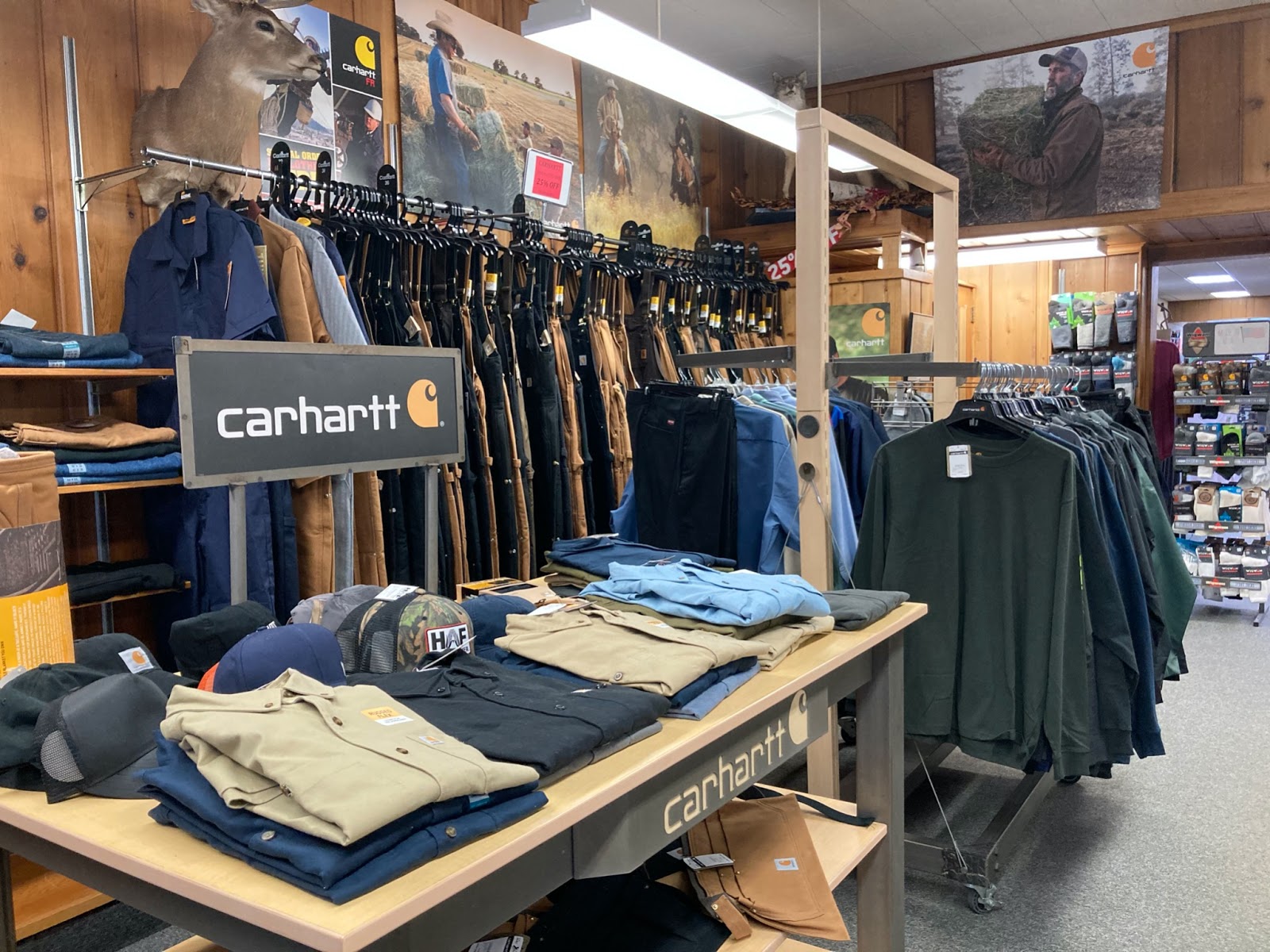
When Hamilton Carhartt first set out along U.S. 12 to sell his new workwear more than 100 years ago, he stopped in Jonesville, Michigan, where he sold his first product to David L. Powers, the founder of Powers Clothing store.
Powers Clothing, established in 1890, has since then not only maintained its longstanding relationship with Carhartt, but also its family business. Fourth generation store owner David Pope now runs the business with his son Jim and daughter Marcy.
“My grandfather had told me that Hamilton Carhartt, when he was just starting out, would go out on the railroad or on horse and buggy and come down U.S. 12, which at that time was Sauck Indian trail, and just go town to town and sell his wares,” David Pope said. “Then he’d go back and make up whatever he’d sold and ship it on.”
Carhartt traveled from Dearborn, Michigan, where his company’s headquarters are still located. David Pope said while the company has grown in the last century, he still maintains a good relationship with the family-owned company.
“When we were going through things for our centennial celebration, we found a check that was made out to Hamilton Carhartt in 1892,” David Pope said. “We gave it to Carhartt and they now have it in their museum in Dearborn. They framed it and put it up on the wall.”
The Pope family still works closely with Carhartt salesman Peter Cook, who said relationships are important in conducting business.
“Hamilton Carhartt used to say, ‘If I don’t make a friend when I make a sale, I’ve failed,’” Cook said. “Dave and I have a good relationship, he’s done a good job. People are buying into this small business and big dreams, and people have a chance, but you have to be doing it right. You better be willing to go all in and that’s all about customer service. He does that.”
While Carhartt remains a family-owned company creating gear for American workers, David Pope said he’s seen a change in trends over the last several decades as the company expanded its clothing line.
“They used to make the old brown work clothes, the coats and pants and bibs that they’d wear on the farm or construction site or for power lines, and they always wore the brown,” David Pope said. “Then they came out with black because a store in New York City downtown said I like those because the black kids are starting to wear them.”
David Pope said Carhartt told the store owner that he would have to order a thousand of the black jackets in order for him to produce enough of them. The store owner agreed and was able to sell them immediately.
“To me, that was the start of the modern Carhartt,” David Pope said. “That was the first time they ever made anything that wasn’t brown and it was for the city in New York for the young people.”
Carhartt now offers clothing for all conditions, from the extreme cold to heat and flames. The company even sells baby clothes and accessories for dogs.
According to the Carhartt history on its website, this change came about in the ’70s and ’80s.
“The Carhartt brand became popular with consumers outside blue-collar trades during the 1970s and 1980s,” the site said. “More people began to learn about the brand as big names in the hip-hop music industry started to wear Carhartt. Interest expanded across the pond in Europe, leading to the creation of the Carhartt Work In Progress label in 1989, which is targeted toward consumers in Europe and Asia, who value refined details and design that remains true to Carhartt’s brand DNA.”
Although the brand has grown, it still maintains its durability and classic look.
“In addition to bib overalls, many garments in today’s product line have historic roots,” according to the site. “The Carhartt Archive holds ads for the legendary Carhartt Chore Coat (known historically as the ‘Engineer Sack Coat’ or simply the ‘Coat’) dating back to 1917. The coat remains largely unchanged to this day.”
Much like Carhartt’s traditional roots, the Pope family strives to maintain the excellent customer service that idenepent small town stores are known for.
“We do everything we can and I think that’s why we’ve been here for as long as we have,” David Pope said. “We try to serve our customers. If we don’t have something, we’ll get it for them if we can, and we alter it and gift wrap at no charge. These are things that independent stores have done for years, but a lot of them just aren’t round anymore.
His son Jim credits the local community and its loyalty for allowing his family to stay in business.
“I think it’s like supporting the diners and local restaurants and that mentality of a person,” Jim Pope said. “They shop local, dine local, and keep it all here.”
He said even several Hillsdale College graduates have come to their store in recent years to get suits for their weddings.
“In 2019, I think we did three weddings for graduates and a couple of them still work at the college,” Jim Pope said. “All three of those weddings had suits that they purchased because they were all going into the world to start working and could use suits so they did that route.”
Even in the modern times of technology and online ordering, David Pope said his efforts in serving his customers are still worth it to him, and he’s always glad to do it.
“Who knows what tomorrow’s going to bring, but I’ve been doing it for over 50 years, and I’ll keep going,” he said.

